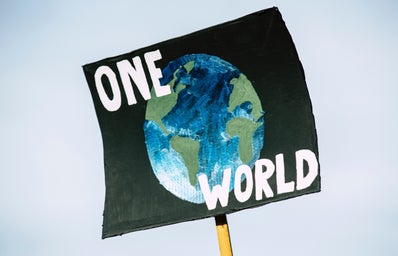2020 was the hottest year on record, and unfortunately it seems that the cut on carbon emissions during the lockdown has had little impact in the fight against climate change. This means that this year, more than ever, will be crucial in the fight against climate change.
Climate change refers to the shift in the average global temperatures. Before the Industrial Revolution, the world’s average temperature was 14°C – since then, temperatures have increased by around 1°C. This increase has been mainly caused by human behaviour, such as through the burning of fossil fuels which releases greenhouse gases. These gases form a blanket around the earth, trapping in heat. The greenhouse effect is natural and indeed crucial for life on earth; however humans have made it worse by adding extra greenhouse gases into the atmosphere. We are already seeing the effects of climate change, with more frequent extreme weather events, such as the Australian bushfires in 2020. It is said that global warming has increased the risk of bushfires in Australia by 30%. Worryingly, greenhouse gases can stay in the atmosphere for hundreds of years, continuing to heat the planet. This means that if all emissions were cut now, global temperatures would continue to rise.
The Intergovernmental Panel on Climate Change (IPCC) stated in 2018 that global warming needs to be limited to 1.5°C to avoid catastrophic results for the planet. The good news is that the IPCC reported that it is possible to reach this target, however it will require serious cuts to emissions of greenhouse gases. This will mean a switch to renewable energy sources and much less deforestation. If these changes aren’t made, global temperatures could rise by 4°C by 2100.
Recently, the government announced its ambitious target to cut carbon emission levels by 78% by 2035. This is a step up from earlier targets, as they previously were aiming to meet this goal by 2050. This is an important step, but the government are yet to set out how this target will be achieved. Likely, we will see the government push for greater use of electric cars and public transport, as well as building more solar panels and wind farms. Crucially, meeting this target will require significant funding, therefore the government will have to show a willingness to invest in the environment and cut budgets elsewhere. This is where the short-sightedness of government, with its 5-year terms, may be a problem. It is also worth pointing out that the government was already off-track to meet the 2050 target, so we should remain wary of the chances of meeting the more ambitious 2035 one.
The EU announced their plans to cut carbon emissions by 55% by 2030 and has pledged to spend at least 30% of its long-term budget on tackling climate change. The US pledged to reduce emissions by 50% by 2035, compared to 2005 levels, likely to try and re-establish themselves as a global leader against climate change. Brazil, Japan, and Canada have also given themselves more ambitious targets to reduce emissions. Of course, this is a global effort and more countries, especially China, will need to do their part to reduce emissions.
Overall then, it seems that many countries are taking more progressive steps to try and meet the 1.5°C target. Whether they follow through and put some force behind their words remains to be seen. It is, after all, much easier to talk and much harder to take concrete action. Some form of global warming is inevitable, however if countries stick to their word and take concentrated, radical action now, we may be able to avoid the worst.



